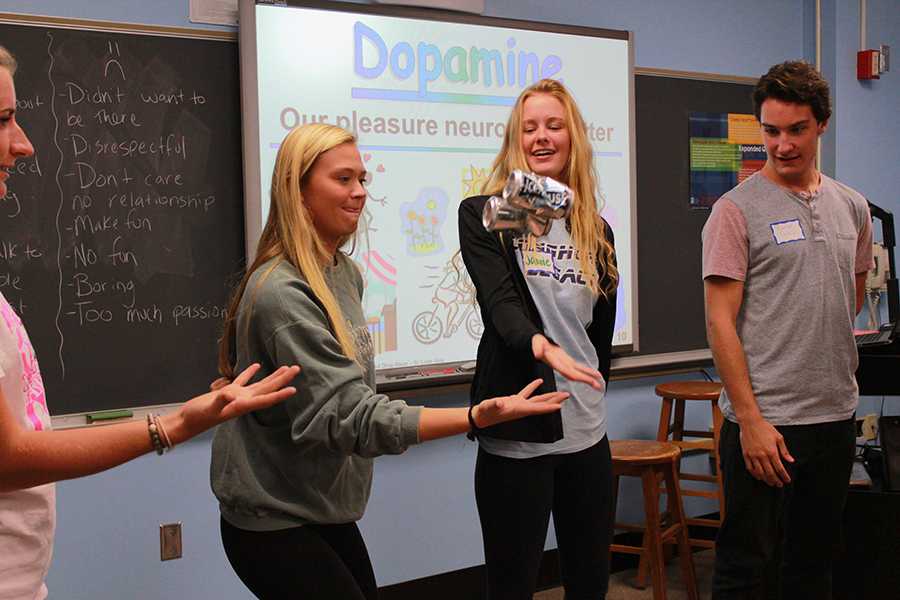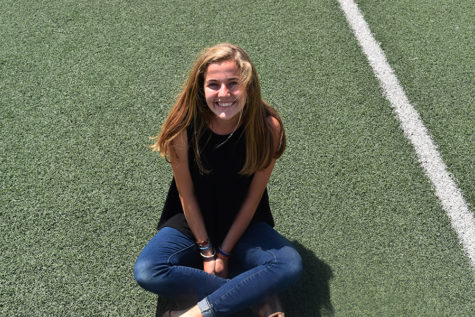On March 15, the lunch room was abuzz with rumors of hypocrisy in the Safe and Drug Free programs at West. A controversial exposé revealing that a minority of drug free leaders engaged in drug and alcohol use elicited strong emotions from students, teachers and administrators alike.
“I was upset with the previous article because I know there are people out there that do not know what the drug free programs are all about, so this story immediately put the programs in a bad light,” junior and Peer Teacher Demi Ferretti said. “It was just kind of negative. It got people talking. I remember when it was published and our whole class was talking about it.”
District SADF leader, Diana Tate, urges students to come to sponsors if they are having an issue maintaining their pledge rather than remaining in the programs. ¬Ý
‚ÄúEvidently we haven‚Äôt got across to them that we are not going to judge you if you can‚Äôt keep the code of conduct; we are not going to blackball them from other activities. We just hope they stand on their integrity and they come to someone on the SADF leadership and say ‚ÄòIt‚Äôs just not going to work for me,‚Äô because it hurts the program so terribly when people are hypocritical,‚Äù Tate said. ‚ÄúIt hurts the program terribly when middle school students see a role model and then later find out those role models have been drinking or smoking marijuana. ¬ÝIt only takes one of those students to cast a bad shadow on our whole programs.‚Äù
One common misconception held by students is that if they ever make a mistake and break their pledge, they will be immediately dismissed from the programs—which is simply not true.
“By owning up to something he or she has done wrong, it demonstrates that the student wants to take steps towards reconciliation. However, there is a consequence [to breaking the pledge]. It does not means that we are going to completely kick you out, but there will be some things you have to do to stay in,” SADF sponsor and West High Physical Education teacher Tommie Rowe said. “There is a two week period where they couldn’t be involved with anything we are doing so if it was pre-middle school field trip, it might mean you cannot go down and teach.”
Students and sponsors agree that the program’s strength lies in the example high school leaders set for middle school students; however, Rowe believes obstacles arise when high school students do not live up to the standard they have set for themselves and middle schoolers are aware.
“The last article was upsetting to me because these students have been down at the middle school, and now if the middle schoolers hear or see that [some of their high school leaders are not keeping their pledges] they will think it is okay for them to do the same,” Rowe said.
Junior Logan Williams‚Äô experience as a High School Hero, Peer Teacher and three time member of the Now and L8R panel discussion has helped him discover the importance of teaching these values to middle school students. ¬Ý
“The maturity level is so different even between eighth grade and freshman year. I feel like I have a responsibility to do this, because younger kids just need a nudge in the right direction. They are just so impressionable, so if you teach them good things at a young age you set them up for a good path and a good life,” Williams said.
Williams‚Äô values originate from his upbringing and the morals his family has instilled him since he was a child.¬Ý

Seniors Grace Miller, Claire Dreller, Jamie Gardner and Connor Gately toss a can to each other during a TryPod field trip.
“From a young age I have been raised to respect other people, respect myself and if something is supposed to be done I want it to be done the right way. Like when they have us sign our contracts saying that we want to live that drug free lifestyle, it actually means something to me; it is not just a piece of paper,” Williams said.
Not only does the Parkway feel strongly about promoting a healthy lifestyle, partners in the greater St. Louis community also are advocates for young adults making safe decisions.
“We are now pairing up with Mercy Medical to make a handout regarding e-cigarettes it will be given to the SADF leaders and other high schoolers. We are just trying to get the word out about e-cigarettes and their effects,” Tate said. “We also partner with American Lung and American Heart Association, and they have help and rehab so students can contact them if they are seeking help for themselves or a friend.”
Students and sponsors are now brainstorming ways to edit the application process and other aspects of the programs to continue building upon its well-regarded reputation.
“Maybe we could require students to get recommendation letters to include on their applications? Or maybe some signatures from meaningful adults. Then you are not just breaking the pledge, you are breaking someone else’s trust,” Parkway Superintendent Dr. Keith Marty said.
Dr. Marty strongly believes that students’ peers are the most influential when it comes to confronting this type of issue.
‚ÄúWhen students confront their peers that is when change happens. Being a leader is a whole different level of expectation, and it can be hard. But it really does make a difference,‚Äù Marty said. ¬Ý
Drug use is not just a problem for Parkway West High School, but a prominent issue throughout the Parkway school district.
“This topic comes up in Parkway at all levels. Even school board members have talked about the compliance of students to these type of pledges,” Marty said. “This issue is not isolated to West High. I think this is something we as a district are facing and should be striving to make better.”
Sponsors of SADF programs agree that the success of these programs can be attributed to the students leaders modeling a safe and fulfilling lifestyle for the peers.
“Our hope has always been to build an army of SADF members. We admire, need and expect a code of conduct 365/24/7 from our leaders and through them the safe and drug free message will spread,” Tate said.




![Freshman Daphne Stokes looks at a table with Veterans Day flyers and information on Nov. 11. Stokes, along with other West High students, like senior Alexander Lewinski, passed by the table in the cafeteria with army recruitment information and giveaways for students to observe during lunch. “Talking with [the recruiters] has definitely helped me [find] where I wanted to go, more than anything else,” Lewinski said.](https://pwestpathfinder.com/wp-content/uploads/2025/11/DSC_1227-2-1200x800.jpg)
![Helping a customer, print room assistant Gretchen Williams operates her booth at the West High Craft Fair from Oct. 25-26. This was Williams’ first time participating in the Craft Fair with her new craft shop, Gs Beaded Boutique. “People have always said, over the years, ‘you should open something.’ [I replied that] I would rather just make [my crafts as] gifts for people. I just started [the online store] up, and it's been okay. I'm always surprised [by] how many views I get and [the] people from different states buying things; somebody from Alaska bought something the other day.”](https://pwestpathfinder.com/wp-content/uploads/2025/11/DSC0451-2-1200x799.jpg)
![Gesturing toward the club’s name on the board, Global Youth Aid co-president year Daniah Alsagheer discusses upcoming service projects with members during a meeting on Oct. 30. “We might be one club at one school, but together, we’re [part of] something much bigger,” Alsagheer said.](https://pwestpathfinder.com/wp-content/uploads/2025/11/DSC00949-1200x800.jpg)
![Focused on providing exceptional service, sophomore Darsh Mahapatra carefully cleans the door of a customer’s car. Mahapatra has always believed his customers deserve nothing less than the best. “[If] they’re trusting us with their car and our service, then I am convinced that they deserve our 100 percent effort and beyond,” Mahapatra said.](https://pwestpathfinder.com/wp-content/uploads/2025/10/DSC_0018-1200x800.jpg)
![Sophomore Aleix Pi de Cabanyes Navarro (left) finishes up a soccer game while junior Ava Muench (right) warms up for cross country practice. The two came to Parkway West High School as exchange students for the 2025-2026 school year. “The goal for the [exchange] program is to provide opportunities for both Parkway students and our international exchange students to learn about other cultures, build connections and become confident, capable, curious and caring — Parkway’s Four C’s — in the process,” Exchange Program Lead Lauren Farrelly said.](https://pwestpathfinder.com/wp-content/uploads/2025/10/Feature-Photo-1200x800.png)

![Gazing across the stage, sophomore Alexis Monteleone performs in the school theater. The Monteleone family’s band “Monte and the Machine” has been releasing music since 2012, but Alexis started her own solo career in 2024 with the release of her first single, Crying Skies. “My whole family is very musical, [and I especially] love writing [songs with them],” Monteleone said.](https://pwestpathfinder.com/wp-content/uploads/2025/09/DSC7463-1200x798.jpg)
![Amid teaching a lesson to her AP Calculus BC class, Kristin Judd jokes alongside her students in their funny remarks. Judd has always enjoyed keeping the mood light in her classroom, along with on the volleyball court. “[I enjoy] that side talk where you see [or] overhear a conversation and chime in, or somebody says something funny,” Judd said.](https://pwestpathfinder.com/wp-content/uploads/2025/09/image-1200x730.jpg)
![Eyeing the ball, junior Ella McNeal poses for her commitment pictures at Clemson University. McNeal’s commitment comes after months of contact with top Division 1 soccer programs. “ It has taken a lot to get to where I am, but I know that [what] I've already been through is just the beginning, and I can't wait for what is to come,” McNeal said.](https://pwestpathfinder.com/wp-content/uploads/2025/09/IMG_4926-1200x900.jpeg)

![Sophomore Shree Sikkal Kumar serves the ball across the court in a match against Lindbergh. Sikkal Kumar has been a varsity member of the varsity girls’ tennis team for two years, helping her earn the number two rank in Class 2 District 2.“When matches are close, it’s easy to get nervous, but I [ground] myself by[staying] confident and ready to play,” Sikkal Kumar said.](https://pwestpathfinder.com/wp-content/uploads/2025/11/DSC2801-1200x798.jpg)
![Dressed up as the varsity girls’ tennis coach Katelyn Arenos, senior Kate Johnson and junior Mireya David hand out candy at West High’s annual trunk or treat event. This year, the trunk or treat was moved inside as a result of adverse weather. “As a senior, I care less about Halloween now. Teachers will bring their kids and families [to West’s Trunk or Treat], but there were fewer [this year] because they just thought it was canceled [due to the] rain. [With] Halloween, I think you care less the older you get,” Johnson said.](https://pwestpathfinder.com/wp-content/uploads/2025/10/DSC00892-1-1200x800.jpg)
![Leaning on the podium, superintendent Melissa Schneider speaks to Parkway journalism students during a press conference. Schneider joined Parkway in July after working in the Thompson School District in Colorado. “My plan [to bond with students] is to get things on my calendar as much as possible. For example, being in [classes] is very special to me. I am trying to be opportunistic [meeting] kids [and] being in [the school] buildings. I have all the sports schedules and the fine arts schedules on my calendar, so that when I'm available, I can get to them,” Schneider said.](https://pwestpathfinder.com/wp-content/uploads/2025/09/IMG_5425-1200x943.jpeg)

![Leaping through the air, senior Tyler Watts celebrates his first goal of the season, which put the Longhorns up 1-0 against the Lafayette Lancers. Watts decided to play soccer for West for his last year of high school and secured a spot on the varsity roster. “[Playing soccer for West] is something I had always dreamed of, but hadn’t really had a good opportunity to do until now. It’s [really] fun being out [on the field], and I’m glad I decided to join the team. It’s just all about having fun with the boys and enjoying what time we have left together,” Watts said.](https://pwestpathfinder.com/wp-content/uploads/2025/09/DSC_1951-1200x855.jpg)

![Shifting global trade, President Donald Trump’s tariffs are raising concerns about economic stability for the U.S. and other countries alike. “[The tariffs are] going to pose a distinct challenge to the U.S. economy and a challenge to the global economy on the whole because it's going to greatly upset who trades with who and where resources and products are going to come from,” social studies teacher Melvin Trotier said.](https://pwestpathfinder.com/wp-content/uploads/2025/05/MDB_3456-1200x800.jpg)

![Pitching the ball on Apr. 14, senior Henry Wild and his team play against Belleville East. Wild was named scholar athlete of the year by St. Louis Post-Dispatch after maintaining a high cumulative GPA and staying involved with athletics for all of high school. “It’s an amazing honor. I feel very blessed to have the opportunity to represent my school [and] what [it] stands for,” Wild said.](https://pwestpathfinder.com/wp-content/uploads/2025/05/unnamed-6-1200x714.jpg)
